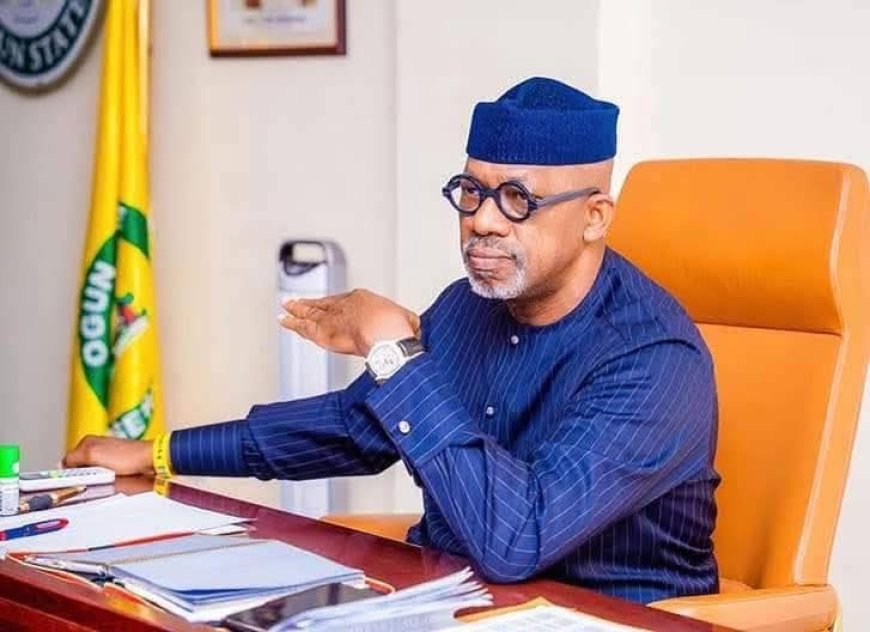Ogun 2027: Abiodun Faces Legacy Test in Succession Politics

As Ogun State steadily moves toward the 2027 political dispensation, it becomes imperative to examine the dynamics shaping the state’s leadership trajectory. More importantly, it is crucial to evaluate the choices before Governor Dapo Abiodun, whose tenure has been marked by remarkable achievements, and to consider the legacy he intends to leave behind.
The politics of succession in Ogun State have often been riddled with controversy. The end of past administrations — from 2011 to 2019 — was characterised by crises and political miscalculations, largely due to the failure of those leaders to deploy sound political strategies. In each case, otherwise commendable records of governance were overshadowed by unpopular succession plans that bred discontent within the polity.
The Matter...
It is undeniable that every past governor of Ogun State left behind visible achievements. Chief Olusegun Osoba, for instance, is fondly remembered for his rural development initiatives, particularly his efforts in rural electrification. Similarly, the administrations of Otunba Gbenga Daniel (OGD) and Senator Ibikunle Amosun recorded significant developmental strides. Yet, their transitions were marred by political missteps that eroded the goodwill they had earned.
1999 to 2003 Dispensation and the 2003 Electoral Cycle
Chief Olusegun Osoba came into office in 1999 and sought re-election in 2003 but lost to Otunba Gbenga Daniel of the Peoples Democratic Party (PDP). Consequently, the issue of succession planning did not arise under Osoba, as he was unable to return for a second term as governor.
2003 to 2011 Dispensation and the 2011 Electoral Cycle
Otunba Gbenga Daniel of the PDP assumed office as governor in 2003 and successfully served two terms, which ended in 2011. He had every opportunity to install a successor but failed due to his misreading of the political climate at the time. Wrong political permutations, coupled with the egoistic pride that often accompanies the office of the governor, ultimately cost him that chance.
2011 to 2019 Dispensation and the 2019 Electoral Cycle
Senator Ibikunle Amosun took office in 2011 and equally governed the state for eight years. Like his predecessor, he failed to install a successor owing to similar political missteps and the arrogance that often comes with power.
In fact, no governor in Ogun State’s history has ever managed a ceremonious transition. They all left office unceremoniously, largely due to their inability to manage succession effectively and their tendency to become archenemies of those they did not favour as successors.
The 2019 Electoral Cycle
Governor Dapo Abiodun emerged as governor in 2019, and his tenure stands out as a turning point in the history of Ogun State. His administration has successfully delivered landmark projects that position the state as a hub for growth and development.
The Gateway International Agro-Cargo Airport has placed Ogun State on the global logistics map. Likewise, the approval and establishment of the Ijebu-Ode Inland Dry Port along the Epe/Mojoda Expressway — backed by the allocation of 130 hectares of land by the state government — represents a major leap in trade facilitation.
The establishment of a Court of Appeal in Ogun State has also enhanced access to justice for residents. Numerous other infrastructural and socio-economic projects continue to redefine the state’s development landscape.
These accomplishments set Governor Abiodun apart as a leader who has not only envisioned but also executed projects with enduring impact.
The Road to 2027: Avoiding Old Pitfalls
As the clock ticks toward 2027, the challenge before Governor Abiodun is not merely to consolidate his achievements but to ensure a smooth and glorious transition. History has shown that unpopular or imposed succession plans can cast a long shadow over otherwise outstanding legacies.
To avoid this, the governor must rise above the errors of his predecessors. His role at this crucial juncture should be that of a father figure and impartial umpire. Rather than relying solely on the counsel of a narrow political circle or a government cabal, he must engage a broader spectrum of voices — within the ruling All Progressives Congress (APC) and across the wider Ogun populace.
True political wisdom lies in listening to the heartbeat of the people. Governor Abiodun should ease the rigidity of power, step beyond the walls of Government House, and interact more with the larger society. By aligning with the popular mandate, he will strengthen both his personal legacy and the future stability of Ogun State.
Conclusively, Governor Dapo Abiodun’s tenure has already etched an indelible mark in Ogun State’s history. However, the pathway to 2027 offers him an even greater opportunity — the chance to script a seamless, dignified, and glorious transition. By embracing inclusivity, fairness, and people-driven politics, he can ensure that his name resonates not only as a performer in office but also as a leader who understood the true essence of legacy: leaving the stage better than he met it.
If We Genuinely Aim to Replicate the Political Success of Lagos in Ogun State...
If we genuinely aim to replicate the political success of Lagos in Ogun State, this is a golden opportunity to change the narrative. Asiwaju Bola Ahmed Tinubu was the architect of modern Lagos politics, ensuring its continuity and sustainability. Many of Lagos’ political heavyweights emerged under his visionary leadership — among them, Senator Solomon Olamilekan Adeola, FCA, popularly known as Yayi.
Without a doubt, Senator Yayi mastered the political game under Asiwaju’s mentorship. He is deeply committed to consolidating political influence across every corner of Ogun State and playing a key role in strengthening the party at all levels.
Akeem Temitope Akilo
2024 APC Chairmanship Aspirant,
Ijebu North East Local Government Area
(State Coordinator, Yayi Progressive Movement -- YPM)

 admin
admin 


